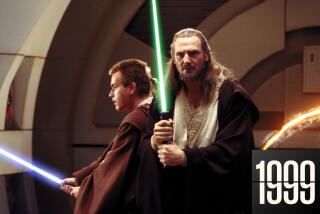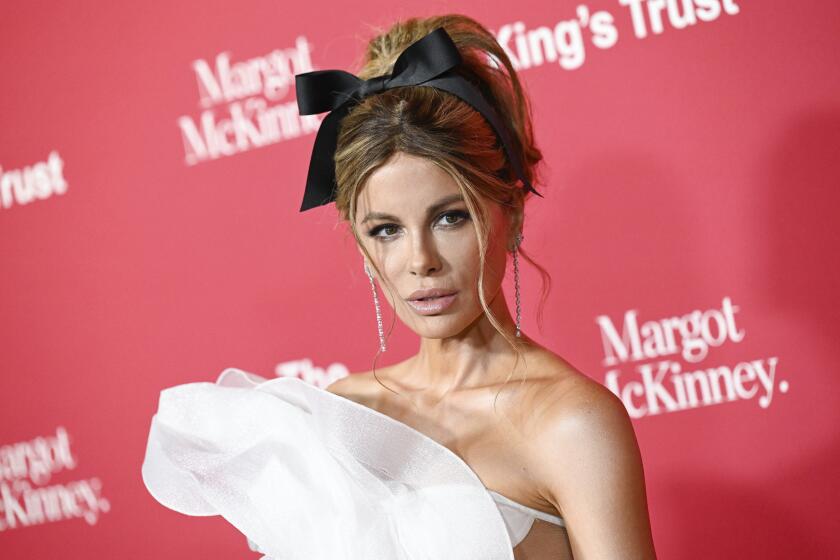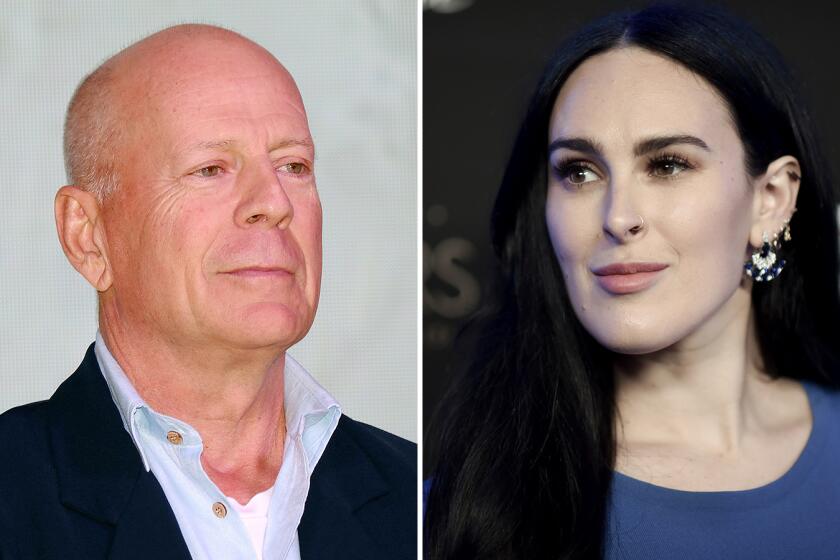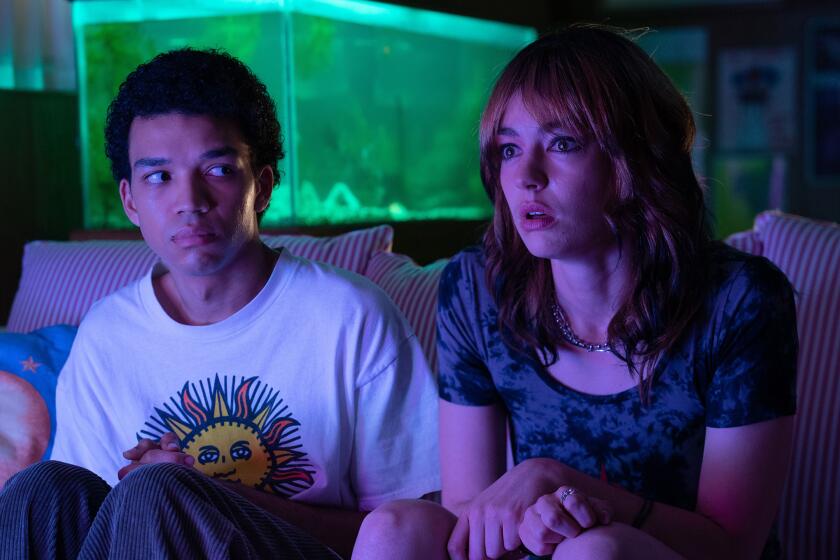Joaquin Phoenix can leave Hollywood-- as long as he comes back
It’s easy to get lost in the physicality Joaquin Phoenix brings to the role of the disturbed and disturbing World War II Navy vet Freddie Quell in Paul Thomas Anderson’s “The Master,” a performance being talked up as a possible awards contender despite the film’s box-office struggles, and despite the shrugging indifference Phoenix has shown about winning anything for it.
His chest creates an almost concave hollow around Quell’s bruised heart, shoulders raised as if in a constant state of anxiety, the eyes furtive, the hands resting on his waist, elbows askew. It is as if he is holding on for dear life and at the same time ready to take flight. So much trouble resides in that body.
But the physical is only one aspect of the enigma that resides inside the character — and the actor.
PHOTOS| Life in Pictures: Joaquin Phoenix
Phoenix goes to such dark places so unflinchingly in “The Master” that I couldn’t shake the image, or the essence of Freddie Quell after I left the theater, and knew it would be a long time before I could. Freddie Quell resonated deeply in another way entirely — he brought Phoenix, one of our greatest actors, back to the movies. I thought we had lost him.
He certainly seemed lost when I caught him on “Late Night With David Letterman” in 2009 not long after he announced he would stop acting and start rapping. It sounded crazy, and on Letterman, he looked crazy — his suit had all the style of a thrift-store loaner, his hair was a matted mess, his responses monosyllabic.
The show aired about the same time that his finely etched turn opposite Gwyneth Paltrow in the twisted romance of “Two Lovers” was making its way into theaters across the country. As Leonard, the suicidal bachelor who falls for Paltrow’s troubled beauty, Phoenix appeared in complete control. It was a small but nicely burnished film from director James Gray, who has been something of a creative safe haven for Phoenix over the years, and is directing the actor again in 2013’s “Nightingale” with Jeremy Renner and Marion Cotillard.
Phoenix’s rap phase — whether real or a hoax as the actor now claims — was chronicled in “I’m Still Here,” the 2010 “documentary” directed by friend/brother-in-law/actor/co-conspirator Casey Affleck. In truth, the film felt bizarrely confessional for such a private person. It’s one of the most intimate video diaries of a breakdown we’ve seen on screen. And I say that in a world of Honey Boo Boos and Jersey housewives, where nothing is sacred. The drugs, the rage, the hookers, the creative obsession and the chip on his shoulder — “I feel a lot of judgment here,” he would say after trying out his rap act in a club one night —seemed all very real. So if it was a prank it just might be his best performance of bad material yet.
Jay Russell, who directed Phoenix in 2004’s “Ladder 49,” once said that he wished the actor would stop torturing himself, but I’m not sure that is even possible. From the beginning — his first credited role came at age 8, he will turn 38 later this month — Phoenix has set himself apart by being unsatisfied by surface scratching, turning down the troubled teen scripts that piled up after his turn in the Ron Howard comedy “Parenthood,” increasingly unwilling to take those kind of roles.
Adoration and accolades have never seemed his endgame. It has always been the work, the character-creating process itself, that he needs, that sustains him.
“I want to leave a mark,” he has said.
PHOTOS: Joaquin Pheonix vs. Andy Kaufman
The depths are always his destination, where the pressure is crushingly intense, where he will be pushed to the brink. For “The Yards,” he bulked up, for “Return to Paradise” he starved, for “Walk the Line” he learned to play the guitar, really well. But it is the altered states of consciousness he achieves — emotional and mental — that ultimately make the character.
Indeed, inside is where Phoenix’s real strength lies, that hidden landscape brought to life gives his performances an indelible quality. Consider again his comeback character of Freddie Quell in “The Master.”
In Freddie, we have someone both distinctive and universal, a reflection of all the lost souls susceptible to the siren song of cults, so seductive in the hands of Philip Seymour Hoffman as the head of a Scientology-like religion. It is sobering to watch the traumatized ex-sailor go from washed-up stranger to inner circle as Hoffman’s Lancaster Dodd slowly reels him in. What keeps it interesting is the undertow of resistance in Freddie that nothing can quite quell.
It was the raw emotion of the ambitious and ruthless Commodus, son of Rome’s revered Marcus Aurelius, in 2000’s “Gladiator” that would bring the actor his first Oscar nomination. Opposite Richard Harris, the scene that marks the final time his father’s love is withheld is pathos made flesh: the son holding the father in a lethal embrace, tears streaming down his face as he realizes that the life he is taking will bring no relief from the pain.
The second nod from the academy would come five years later as he slipped into the soul of country music icon Johnny Cash. The performance was memorable for its lack of imitation, the many shades of light and dark he used to resurrect the Man in Black. Before the film came out, the casting seemed a risky gambit; after, you cannot imagine anyone else in the role.
That, in a sense, is one of the true measures of a performance — when the actor makes it so much his or her own, even the thought of anyone else seems a betrayal. Like Marlon Brando in “On the Waterfront” or Robert De Niro in “Raging Bull,” no one else will do.
When Phoenix was 15, not long after he finished “Parenthood,” he “retired” for the first time. He didn’t come back to acting in a serious way for roughly four years. When he did, it was a steady slow build of good turns in a mix of good and not-so-good films, managing to refine what he put on screen without watching the finished product — an experience he calls “unendurable.” All he could see on screen were the mistakes he made, what he failed to do. He was just as uneasy with the Hollywood trappings that came with the work, the interviews, the red carpets, the necessary shilling for the film.
Should, at some point in the coming years, Phoenix need a break from all that again, to go a little nuts, so be it. All I would ask is that he come back. And keep coming back — to the screen, or the stage — where he can move us, enlighten us, unsettle us, entertain us. He has a gift. To waste it, or walk away from it, or rap about it — now that would be crazy.
MORE AWARDS COVERAGE:
Oscar Race: Who’s in the lead?
TIMELINE: Academy Awards through the years
More to Read
Only good movies
Get the Indie Focus newsletter, Mark Olsen's weekly guide to the world of cinema.
You may occasionally receive promotional content from the Los Angeles Times.







